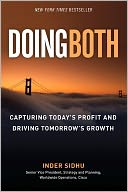 Doing Both: Capturing Today?s Profit and Driving Tomorrow?s Growth
Doing Both: Capturing Today?s Profit and Driving Tomorrow?s Growth
Inder Sidhu
FT Press/Pearson (2010)
Organizational transformation is not ? repeat not ? a zero-sum game
One of the most self-defeating mindsets is suggested by the admonition, ?You can?t have your cake and eat it too.? Obviously there are situations when there are two options that are mutually-exclusive. However, most of the time, when facing a choice, it is a mistake to select only one and dismiss all others. Inder Sidhu does not advocate ?a balanced compromise between two objectives, but [rather] a mutually reinforcing multiplier in which each side makes the other better.? He cites comments included in Built to Last (1994) co-authored by Jim Collins and Jerry Porras when discussing a highly visionary company ?that doesn?t want to blend yin and yang into a gray indistinguishable circle that is neither highly yin nor highly yang; it aims to be distinctly yin and distinctly yang ? both at the same time, all the time. Irrational? Perhaps. Rare? Yes. Difficult? Absolutely.?
Sidhu devotes the bulk of his lively narrative to explaining how exemplar companies such as Apple, BYD, Cisco, GE, Google, IBM, and Procter & Gamble achieve these strategic objectives:
? Improving the core business while conducting disruptive innovation
? Strengthening current account relationships while adding new ones
? Fine-tuning what is done well while transforming or eliminating what isn?t
? Creating customer evangelists while creating steadfast partners
? Thriving on ?Main Street? while exploring ?the road less traveled?? Doing it right and doing what is right (i.e. what matters)
Obviously, doing both (of whatever) is not always possible or, when possible, advisable. Also, any lessons learned from the exemplar companies such as those Sidhu examines (especially Cisco) must be modified to accommodate the specific needs and resources of much smaller organizations.
With all due respect to the value of these lessons, I think the single greatest benefit of this book is the mindset it can help its reader to develop. Although Sidhu does not cite them and their books, he has clearly been influenced (albeit indirectly) by business thinkers such as Henry Chesbrough (Open Innovation and Open Business Models) and Roger Martin (The Opposable Mind) as well as Venkat Ramaswamy and Francis Gouilllart (The Power of Co-Creation). The most effective executives an open mind in combination with insatiable curiosity, emotional intelligence, and highly-developed skills for integrative thinking. Organizations as well as individuals must never play a zero-sum game. Long-term growth and short-term profitability are NOT mutually exclusive.
The authors? recommendations in the aforementioned books track almost seamlessly with Sudhu?s own:
1. Be open-minded to possibilities, whenever/wherever they occur
2. Respect and examine those that are plausible, especially if unorthodox
3. Seek out collaborations that are mutually-beneficial
4. Welcome each ?failure? as a precious learning opportunity
5. Juxtapose (for rigorous scrutiny) contradictory ideas and options
6. Embrace change as an ally, not as a threat
7. Achieve constant improvement with a discovery-driven process
8. Welcome and support principled dissent
9. Cultivate and nourish an insatiable appetite for learning
10. Constantly challenge what James O?Toole characterizes as ?the ideology of comfort and the tyranny of custom?
I highly recommend all of the aforementioned books as well as Dean Spitzer?s Transforming Performance Measurement; also Enterprise Architecture as Strategy co-authored by Jeanne Ross, Peter Weill, and David Robertson.
Tags: "the ideology of comfort and the tyranny of custom", Apple, Built to Last, BYD, Cisco, David Robertson, Dean Spitzer, Doing Both: Capturing Today's Profit and Driving Tomorrow's Growth, Enterprise Architecture as Strategy, Francis Gouilllart, FT Press/Pearson, GE, Google, Henry Chesbrough, IBM, Inder Sidhu, James O'Toole characterizes, Jeanne Ross, Jerry Porras, Jim Collins, long-term growth and short-term profitability are NOT mutually exclusive, Open Business Models, Open Innovation, Organizational transformation is not -- repeat not - a zero-sum game, Peter Weill, Procter & Gamble, Roger Martin, The Opposable Mind, The Power of Co-Creation, Transforming Performance Measurement, Venkat Ramaswamyscotty mcknight cato cupertino priceline bridge visceral sugarland
No comments:
Post a Comment
Note: Only a member of this blog may post a comment.